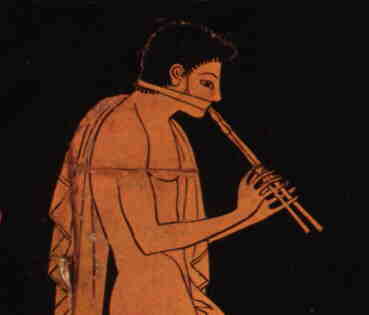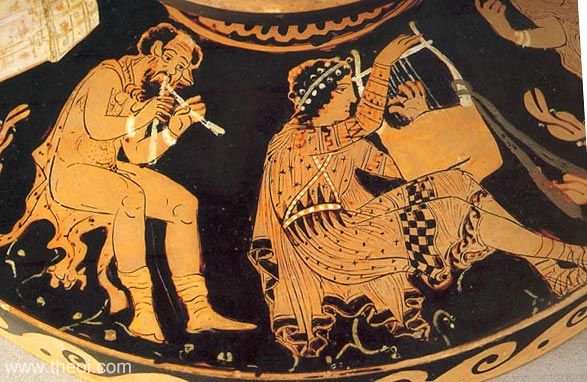From his college web page, Dr. Howard specializes in the culmination and influence of classical music in the pop culture as well as music history in general. He enjoys relating the ancient to the modern and looking for those traditions passed down from each respective culture. Here are a few of his responses:
For a Greek citizen how did music play into daily life?
Well, it depends. There was limited tradition for those educated elite. For others in the lower classes there was very limited musical influence. Most everyone is involved in religious festivals and large events but that was the extent. The lower classes still had music, song and singing although it wasn't as prominent. |
| A Double Aulos |
Did the average family have instruments in the home or musical abilities?
There were some instruments that the typical home might have, like the double reed instrument called the Aulos. These were relatively easy to obtain and were the more common at the time. Some of the instruments that you would think of like the lyre and others were more for the elite class.
What do we learn from the elements in the music about Greek Culture?
Greek music shows some of the elements that today's western music contains, including the importance of the perfect fifth, other intervals like the third.
What is something that the culture has contributed to today's music theory?
Music in Greek life is a way of seeing into the way of thinking for the Greeks. The types of music, their chord structures and rhythms, the amount of involvement in music and musical instruments all serve to teach a bit about what kind of a people lived in the prominent isles of the Mediterranean thousands of years in history.


I think its interesting that the Greek music was not passed down and absorbed into later cultures, especially since so much of Greek culture has survived the test of time. Today, countries around the world participate in the Olympics, we all recognize the names of Aristotle, Plato and Socrates, and studying Greek mythology is part of the curricula of most high schools in the US.
ReplyDeleteDoes this mean that the modes (aeolian, phrygian, lydian, mixo-lydian, etc.) are from... somewhere else? If so, where?
ReplyDeleteMay I just say that I LOVE Professor Howard. He is so awesome.
ReplyDeleteThanks for including those links! Love 'em.
I never realized that the only connection with elite music was during religious ceremonies. As a classical musician, and, therefore, one of the musical "elites" (?) (or maybe I'm just an elitist?!), I find church music rather simple and "common." I wonder if Greek musical "elitists" found religious music to be the same?
I'd also like to add that "common" music today has a TON of similarities to "common" music back then. BIGGEST SIMILARITY - it fades. It's not important. (We're talking pop singers, etc. Except the Beatles. :D)
I beleive so Samuel. For example, the aeolian mode from what brief research is Greek music theory terminology but it was actually defined during the sixteenth century Heinrich Glarean who reused the name.
ReplyDelete